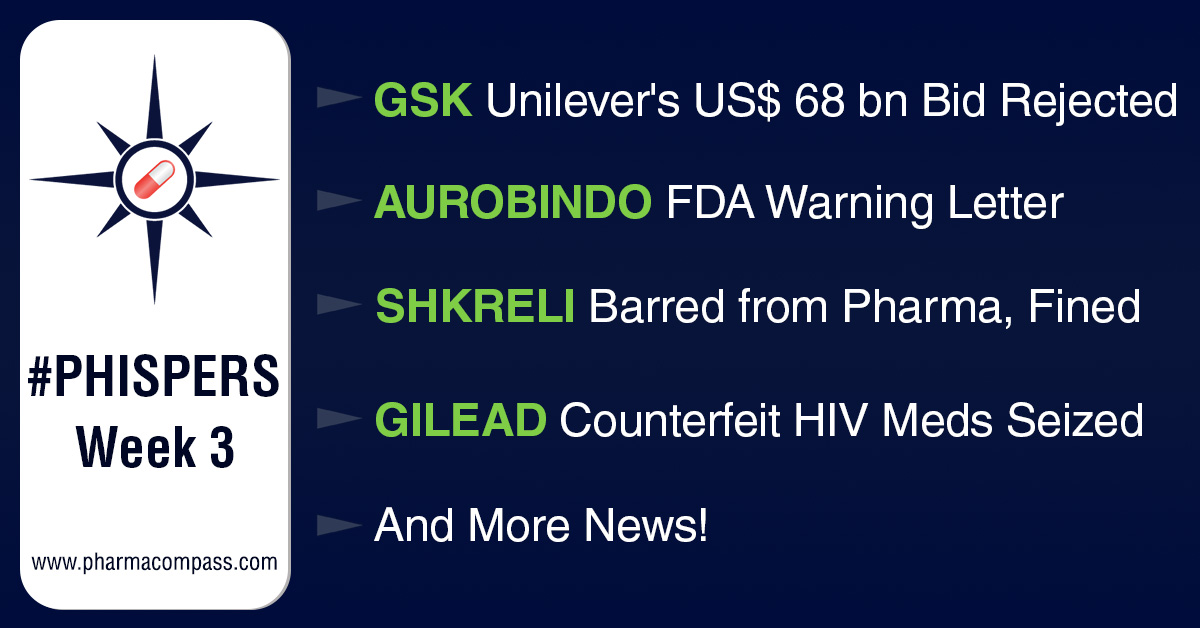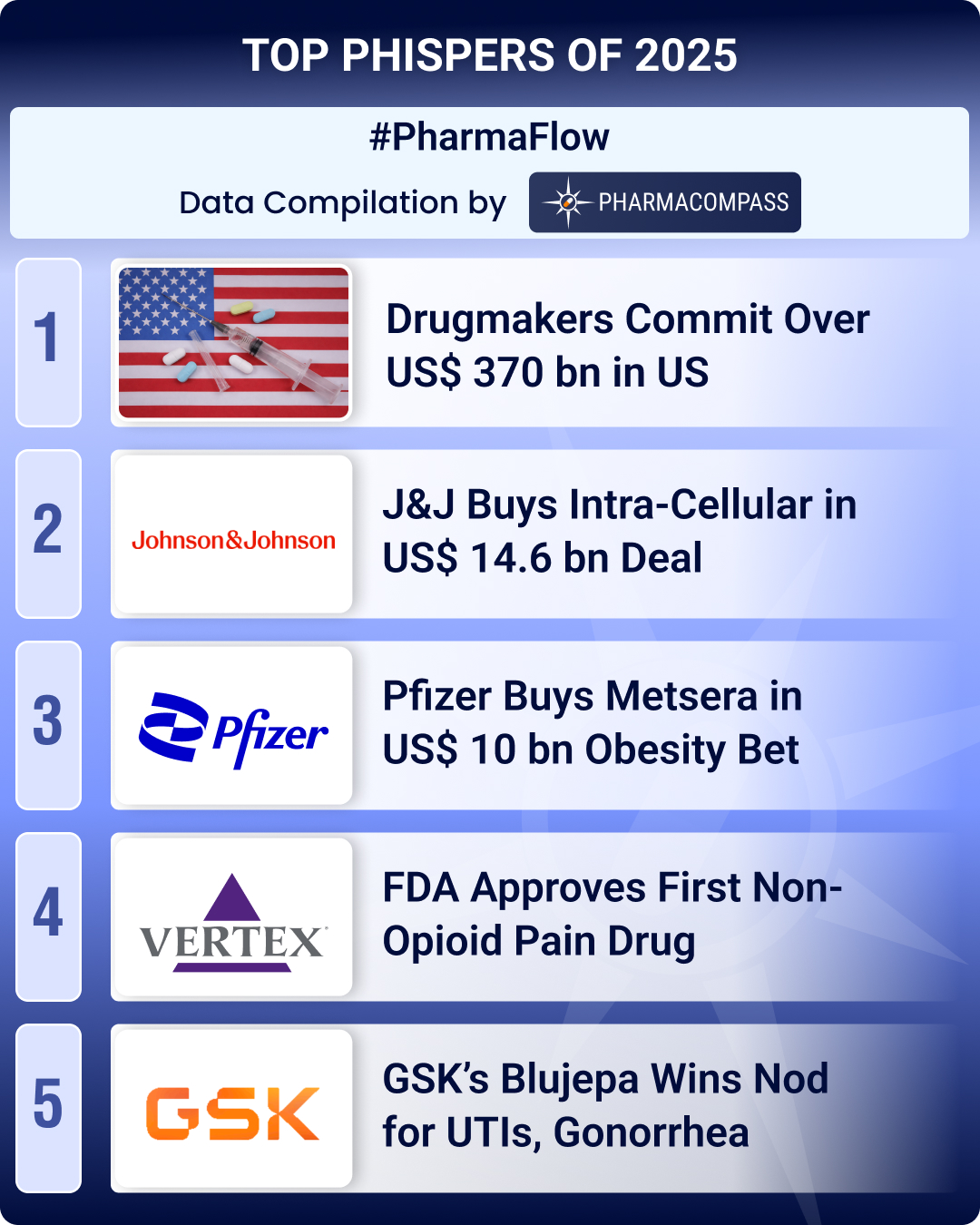
By PharmaCompass
2022-01-20
Impressions: 2239
In this week’s Phispers, we bring you news that GlaxoSmithKline has rejected a US$ 68.4 billion (£50 billion) offer from Unilever for its consumer healthcare unit on the pretext that the bid “fundamentally undervalued” the business. Unilever, on the other hand, has said it will not raise the offer, and has effectively abandoned its plans to buy the unit.
A federal judge in the US has fined Martin Shkreli US$ 64.6 million and barred the former pharma executive from the industry for life.
Gilead said an unauthorized network of drug distributors and suppliers have sold pharmacies over US$ 250 million worth of counterfeit versions of its HIV treatments, which were illicit and potentially dangerous.
In regulatory news, Aurobindo Pharma’s active pharmaceutical ingredient (API) manufacturing facility in Hyderabad, India, has received a warning letter from the US Food and Drug Administration (FDA) for seven violations. And Catalent’s Brussels facility has received FDA’s Form 483, causing major supply woes for Novo Nordisk’s obesity drug Wegovy.
In deals and M&A news, Belgian biopharma UCB has acquired Zogenix for US$ 1.9 billion to expand its portfolio of rare disease drugs and epilepsy treatments. And American drugmaker Eli Lilly has entered into a three-year collaboration with German biotech Evotec to discover five metabolic disease drugs in a deal that could fetch Evotec up to US$ 1 billion.
Unilever won’t pursue consumer health unit after GSK rejects its US$ 68.4 billion offer
British pharma major GlaxoSmithKline (GSK) on Saturday said it had rejected a £50 billion (US$ 68.4 billion) offer from Unilever for its consumer healthcare unit as the bid “fundamentally undervalued” the business and its future prospects.
GSK said it had received three bids for its consumer healthcare unit from Unilever, the latest on December 20 comprising £41.7 billion (US$ 57 billion) in cash and £8.3 billion (US$ 11.3 billion) in company shares.
Pfizer owns a 32 percent stake in GSK’s consumer healthcare business, which generates annual sales of around £10 billion (US$ 13.7 billion). Analysts have valued the unit at around £45-48 billion (around US$ 61.5 to 65.6 billion). While confirming the approach, the consumer goods giant said it would not raise its £50 billion (US$ 68.4 billion) offer, effectively abandoning its plans to buy GSK’s consumer healthcare business.
The British drugmaker said it remains committed to spinning off the consumer healthcare business into a separate entity and focus on its pharma business. By mid-2022, once the demerger is complete, GSK expects the consumer health division to deliver organic sales growth in the range of four to six percent over the medium term.
About 45 percent of GSK’s consumer healthcare portfolio falls under oral care and VMS (vitamins, minerals, and supplements), including bestsellers like Sensodyne toothpaste and Panadol painkiller – categories Unilever already has presence in. If GSK had accepted the deal, it would have been the biggest globally since the start of the pandemic.
Meanwhile, GSK’s chief scientific officer (CSO) Hal Barron is leaving the company in August to run Altos Labs, a new biotech based in San Francisco, California, which is focused on cellular programming. GSK said Tony Wood will become CSO designate and assume full accountability for R&D on August 1, adding that Barron will become a non-executive director at GSK on that date, with additional responsibilities to support R&D.
Shkreli to return US$ 64.6 million it profited by hiking price of Daraprim
A month after his former company agreed to pay US$ 40 million to settle allegations of anticompetitive conduct on anti-parasitic drug Daraprim, a federal judge ordered pharma executive Martin Shkreli to return US$ 64.6 million he profited by jacking up the price of the lifesaving drug and stifling competition.
The judge also barred Shkreli, who is serving a seven-year sentence for a separate fraud case, from working in the pharmaceutical industry again.
The lawsuit was filed by the Federal Trade Commission (FTC), New York, and six other states against Shkreli in 2020 for illegally preventing other companies from creating cheaper generic versions of Daraprim.
Shkreli was the CEO of Turing Pharmaceuticals, now Vyera, when it raised the price of Daraprim from US$ 13.50 to US$ 750 per pill — a hike of 5,000 percent — after obtaining exclusive rights to the decades-old drug in 2015. It treats a rare parasitic disease in pregnant women, cancer patients and AIDS patients.
The move had sparked outrage across the US. Shkreli resigned as Turing’s CEO in 2015, a day after he was arrested on securities fraud charges related to two failed hedge funds he ran before getting into the pharmaceutical industry.
Aurobindo Pharma’s Hyderabad unit receives FDA warning letter for GMP violations
Indian drugmaker Aurobindo Pharma said it has received a warning letter from the US Food and Drug Administration (FDA) for non-compliance of the agency’s regulations at its Unit I active pharmaceutical ingredient (API) manufacturing facility in Hyderabad, India.
Following an inspection in August 2021, the FDA had issued a Form 483 to the Indian drugmaker, pointing out seven violations of good manufacturing practices (GMPs). The warning letter follows the same inspection and makes it clear that the company must correct the problems and provide a timeframe for the same. The facility manufactures APIs for cardiovascular, central nervous system, anti-allergies and non-sterile cephalosporins.
The violations include inadequate evaluation and qualification of critical material suppliers, inadequate sampling plans for raw materials and intermediates, not testing components used in manufacturing, failure to ensure investigations were scientifically sound and not properly maintaining equipment.
Aurobindo said it is engaging with the US drug regulator and is fully committed to resolving the issue at the earliest. “The company believes that this will not impact the existing business from this facility,” it stated.
FDA’s Form 483 to Catalent’s Brussels site behind Novo’s obesity drug supply woes
Contract development and manufacturing firm Catalent’s syringe filling facility in Brussels, Belgium, has received a Form 483 from the US Food and Drug Administration (FDA), contributing to major supply woes for Novo Nordisk’s obesity drug Wegovy.
The FDA’s Form 483 pointed out seven violations, including failure to thoroughly investigate batch failures or discrepancies, issues related to high-efficiency particulate absorbing (HEPA) filter failures, problems with written procedures for production and process control along with subpar equipment maintenance. The US agency had inspected the 265,000-square-feet site from October 18 to 26, 2021.
Last month, Novo had issued an apology to its customers for the delay in supply of Wegovy, citing a temporary halt in supply from a contract manufacturer. The drug had sold out in June, soon after it received the FDA’s approval.
Catalent’s Brussels site has been handed 12 Form 483s during nine inspections by the FDA, though it is possibly the first time that production has been halted following a warning letter.
Novo settles insulin lawsuit in Denmark: In August 2019, several shareholders of Novo Nordisk had alleged that the company had made misleading statements and did not make appropriate disclosures regarding its sales of insulin products in the US. They had made a claim of around US$ 1.8 billion (11.78 billion Danish krone).
Last week, Novo Nordisk said it has settled this lawsuit that had been filed in Denmark. The agreement “contains no admission of liability, wrongdoing or responsibility by Novo Nordisk,” and the company won’t make any payments to plaintiffs, the company said in a statement.
Unauthorized drug distributors sold counterfeit Gilead HIV treatments over two years
Over the last two years, an unauthorized network of drug distributors and suppliers have sold pharmacies over US$ 250 million worth of counterfeit versions of Gilead Sciences’ HIV treatments, the company said. According to a report published in the Wall Street Journal, these treatments were illicit and potentially dangerous.
Gilead said it found 85,247 bottles that had been tampered with or faked, including versions of its Biktarvy and Descovy treatments. As part of its investigations, the company said it has seized the bottles of Gilead-labeled medications from 17 locations in nine states of the US.
Counterfeiters used authentic, but often empty or near-empty bottles that once contained its HIV medication, the company said in a statement. Many of the counterfeit drugs were purchased from homeless or drug-addicted HIV patients and then resold using falsified documentation, a Gilead spokesperson said.
These counterfeiters then substituted fake tablets and documentation and resealed the bottles so they would “resemble” unopened, authentic bottles. “Gilead has uncovered and stopped a complex and criminal enterprise distributing counterfeit Gilead HIV medication through the legitimate US supply chain,” the spokesman said. The company has accused 22 defendants of violating federal trademark and New York consumer protection laws for their roles in the distribution of “dangerous” counterfeits.
Belgian biopharma UCB buys epilepsy drugmaker Zogenix for US$ 1.9 billion
Belgian biopharma UCB has acquired Zogenix for US$ 1.9 billion to expand its portfolio of rare disease drugs and epilepsy treatments. The Belgian firm has offered US$ 26 per share in cash to seal the deal.
The California-based firm had received US and EU approvals for its drug Fintepla that treats Dravet syndrome (a rare form of childhood epilepsy with limited treatment options) in 2020. The drug brought in sales of US$ 21.4 million in the third quarter of 2021. It is now seeking an approval for Fintepla to treat Lennox-Gastaut Syndrome (LGS), another rare form of childhood epilepsy.
Acquiring Zogenix will allow UCB to move deeper into the epilepsy market, where it already has four products, including Vimpat and Briviact that treat different types of seizures.
ProKidney merger: Blank-check firm Social Capital Suvretta Holdings Corp III – backed by Sri Lankan-born Canadian and American venture capitalist Chamath Palihapitiya – on Tuesday said it will merge with biotech firm ProKidney to form an entity valued at US$ 2.64 billion.
A blank-check firm, also known as a special purpose acquisition company (SPAC), is a publicly traded investment firm that merges with a private company to take it public, bypassing an initial public offering (IPO).
The merger with Social Capital Suvretta Holdings Corp III will give ProKidney up to US$ 825 million to advance research and development of its treatment for chronic kidney diseases. It includes US$ 250 million that Suvretta raised through an IPO in July last year and a US$ 575 million private investment in equity.
Eli Lilly partners with Evotec for metabolic drugs in deal worth US$ 1 billion
American drugmaker Eli Lilly has entered into a three-year collaboration with German biotech Evotec to discover five metabolic disease drugs in a deal that could fetch Evotec up to US$ 1 billion.
As part of the deal, Evotec will explore potential drug candidates for the treatment of diabetes and chronic liver disease. Lilly will select up to five candidates, further develop and commercialize them.
Evotec will receive an undisclosed amount as an upfront payment along with performance-based milestone payments of up to US$ 180 million per program, and royalties on any product arising out of the collaboration.
In another deal, Lilly has agreed to pay Abbisko Therapeutics up to US$ 258 million for a cardiometabolic treatment. While Shanghai-based Abbisko will lead discovery and development, Lilly will develop and commercialize any potential candidate.
The PharmaCompass Newsletter – Sign Up, Stay Ahead
Feedback, help us to improve. Click here
Image Credit : Phisper Infographic by SCORR MARKETING & PharmaCompass is licensed under CC BY 2.0
“ The article is based on the information available in public and which the author believes to be true. The author is not disseminating any information, which the author believes or knows, is confidential or in conflict with the privacy of any person. The views expressed or information supplied through this article is mere opinion and observation of the author. The author does not intend to defame, insult or, cause loss or damage to anyone, in any manner, through this article.”







